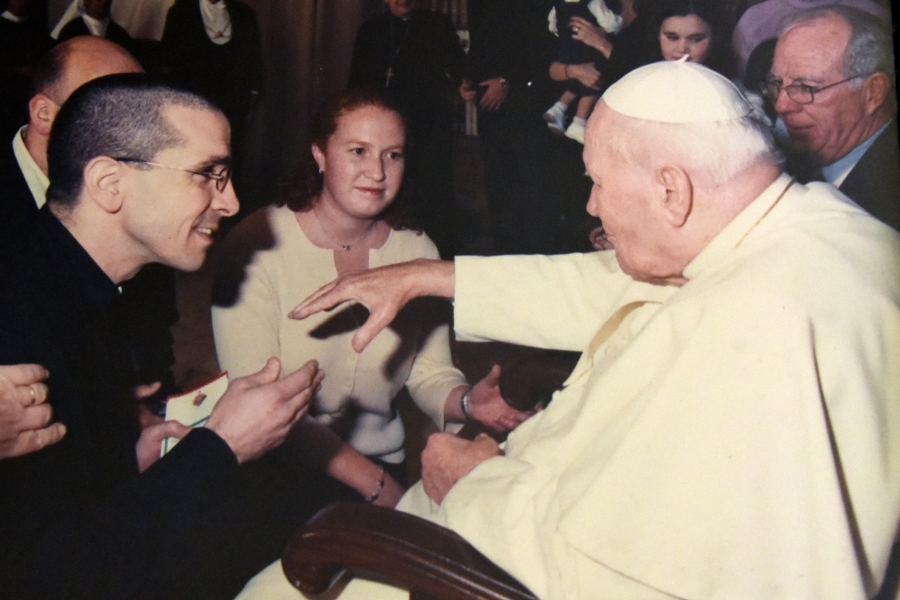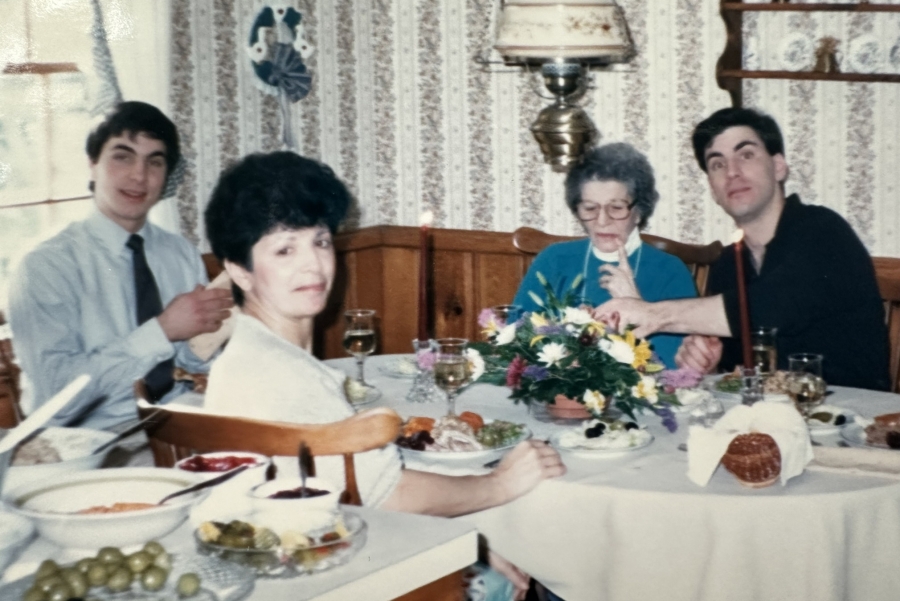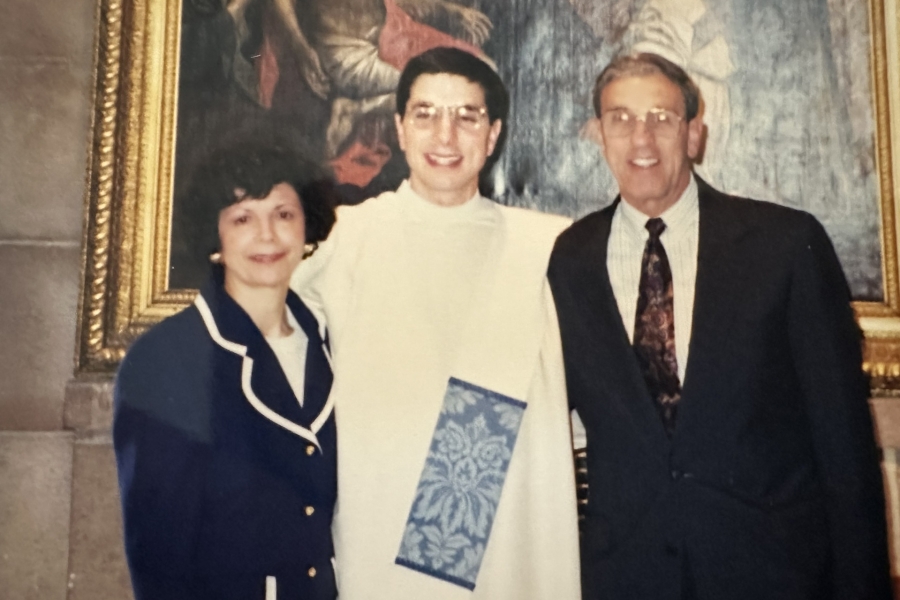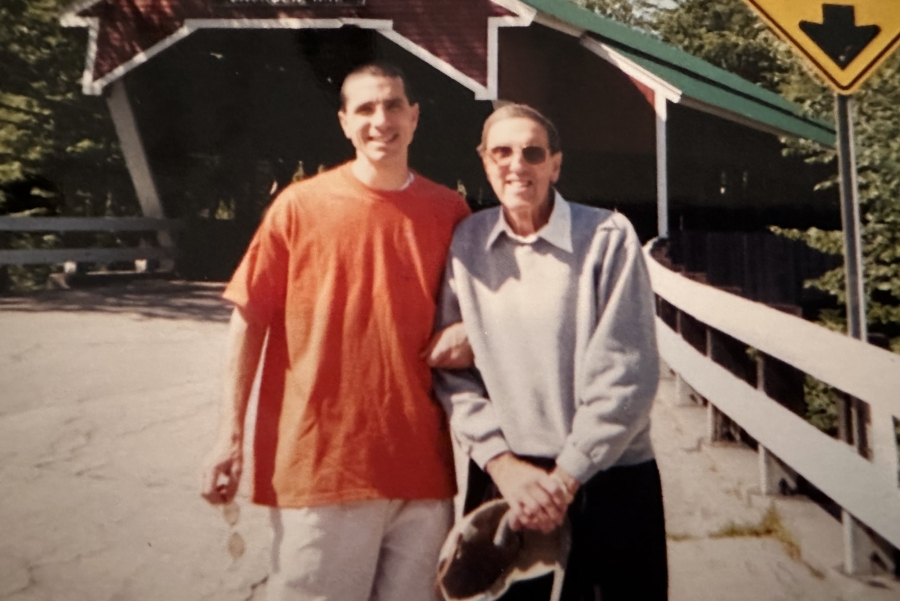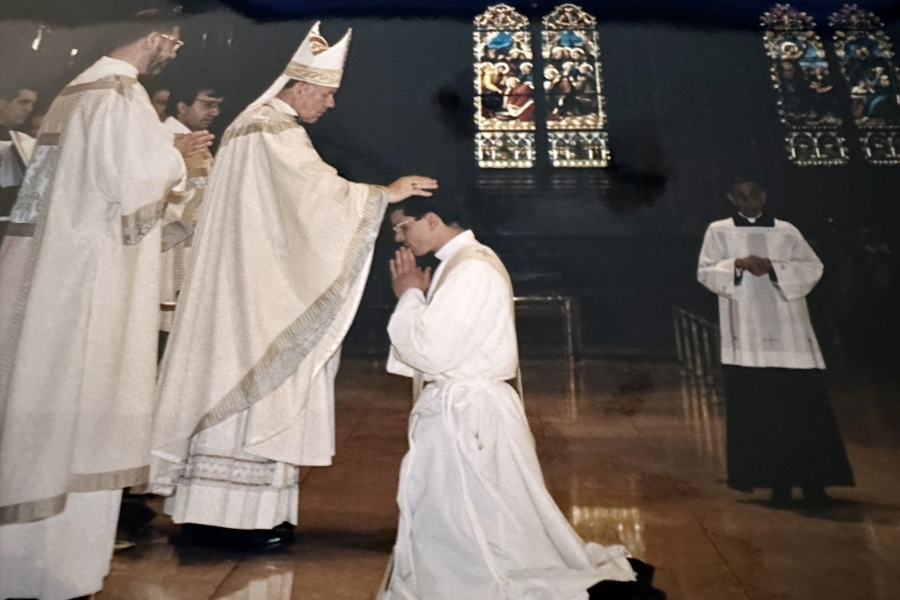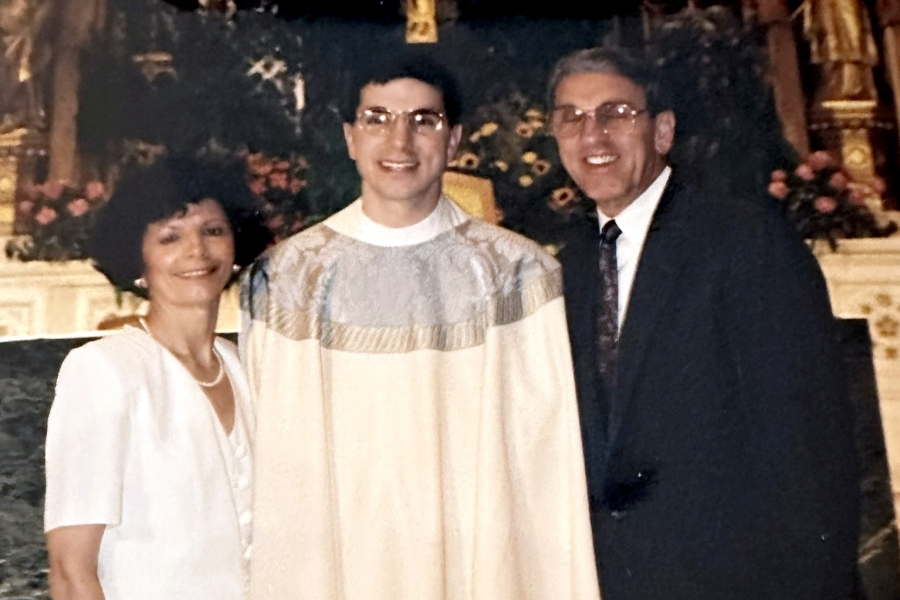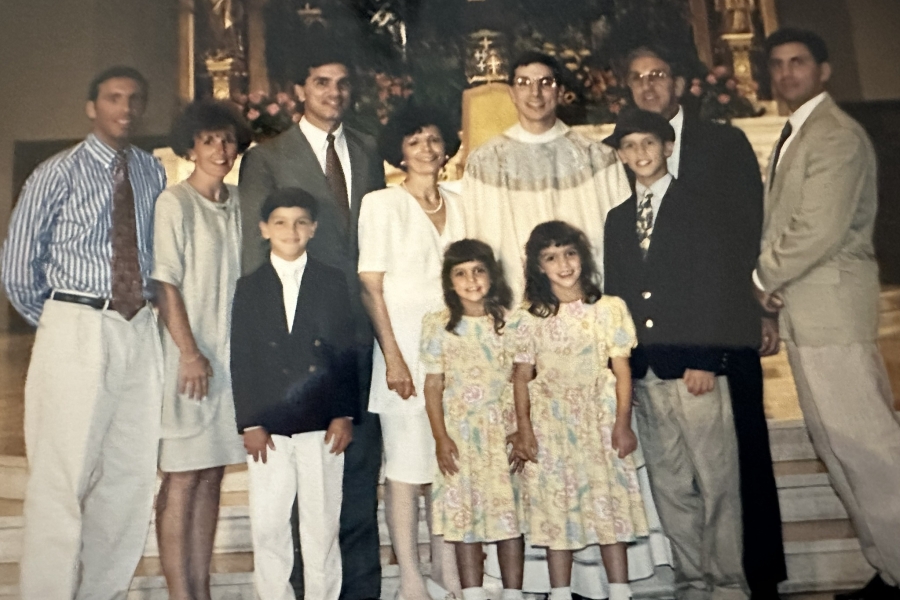Welcome, Bishop James Ruggieri
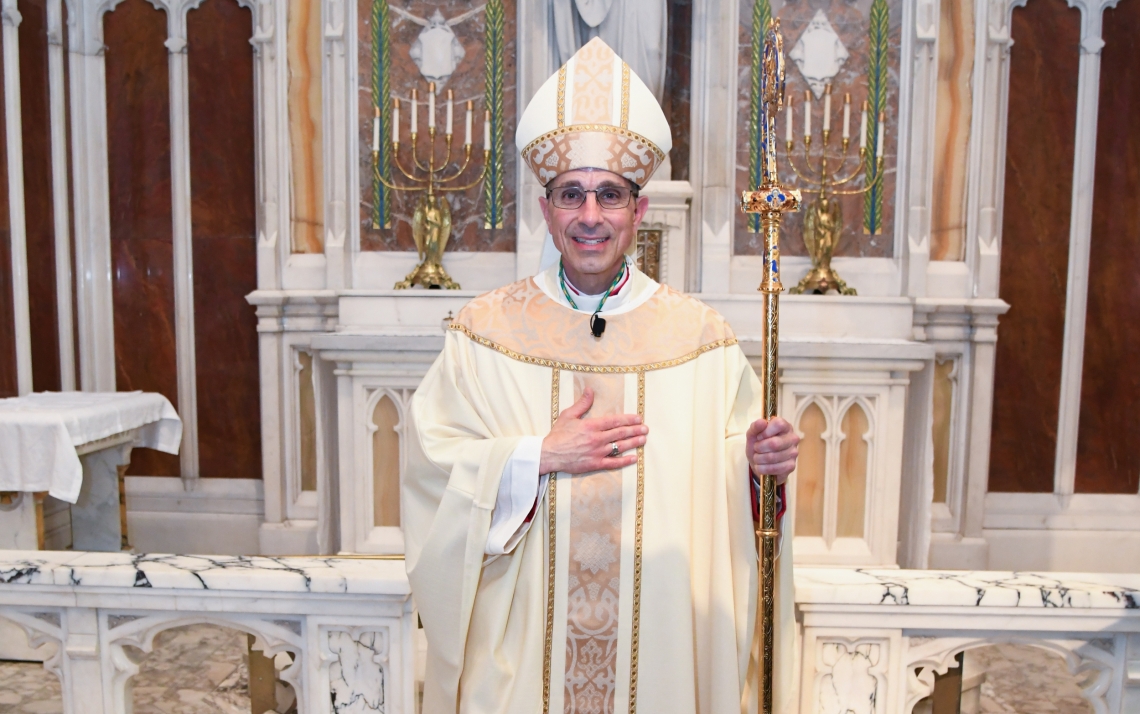
“I want to love the people of Maine. I want to serve them, and I want to grow with them in faith.”
Bishop James Thomas Ruggieri says it is with a willing heart and a spirit of joy and service that he begins his ministry as the 13th bishop of Portland.
“I can tell you that I will give my absolute all, do my best,” he says.
Pope Francis appointed then-Father Ruggieri to be the next bishop of Portland on February 13. With Cardinal Seán Patrick O’Malley, OFM Cap., serving as the principal celebrant, serving as principal celebrant, he was ordained and installed on May 7 at the Cathedral of the Immaculate Conception in Portland.
"It's really overwhelming,” Bishop Ruggieri said following the Mass. “The thoughts that are going through my head are ones of lots of gratitude, really all gratitude to God.”
Bishop Ruggieri comes to Maine from the Diocese of Providence, Rhode Island, where he had served as a priest for nearly 29 years, most recently as pastor of two parishes in the city of Providence, St. Patrick and St. Michael the Archangel.
The phone call that would change his life came on February 3, just five minutes before he was to celebrate the 4 o’clock Mass at St. Patrick.
“It was a phone call out of the blue,” says Bishop Ruggieri. “It may sound kind of primitive. You get a phone call. But that’s how it happened,”
The call was from Cardinal Christophe Pierre, apostolic nuncio to the United States. It was actually the cardinal’s second attempt at delivering the news. Bishop Ruggieri says the first time, he was in the confessional, so he ignored the call, but then, about an hour later, he saw the same Washington, D.C., number come up on his phone.
“When I saw the number the second time, and there was no scam alert or anything like that, I said, ‘Let me answer this.’”
Bishop Ruggieri says he experienced a whirlwind of emotions when the cardinal explained why he was calling.
“Obviously, a host of feelings and emotions and all those kinds of things flooded me,” he says.
Despite being caught off guard by the news and the brevity of the conversation, necessitated by the approaching Mass, Bishop Ruggieri says his answer was an instant yes.
“Since being ordained a deacon in 1994, my mindset, my heartset, is that, as an ordained minister, I am basically here to serve the Church,” he says “My mindset has always been that way. I just go where I am sent. I know this is a much bigger responsibility, but I thought, ‘Who am I to say no to the pope, to the Holy Father?’ That was another thought that came to mind. I can’t say no to the Holy Father.”
He says it comes down to the promises of obedience he made during his ordination to the transitional diaconate and to the priesthood.
“I love obedience. You’re told what to do and you do it. Obviously, if it’s something I know I am either going to fail miserably at or it’s going to be spiritually dangerous, I would reconsider, but the things I’ve been asked to do, I have just simply accepted because it’s obedience.”
Bishop Ruggieri admits that the cardinal’s phone call made it a little tough to concentrate during that Saturday evening Mass.
“I was thinking to myself, ‘Did this really happen? Am I imagining this?’ Especially the next morning when I woke up, the same thought came to mind, but I said, ‘No, I know that really happened.’”
He received confirmation when Cardinal Pierre called back the next day to make sure that the answer had, indeed, been yes.
“I was so overcome with the prospect of being bishop of Portland that I didn’t really articulate it well the day before, so he just asked for confirmation,” Bishop Ruggieri says.
Although he didn’t hesitate to accept, he says with his limited experience in diocesan-level administration, he couldn’t help but wonder, “Why me?”
“I’ve been on some councils and committees with the bishop, but I’ve never served the administration like some of our priests have, so as I was going through my own experience, I thought to myself, ‘Am I the best choice for this?’”
Those who know him well have no doubts that he is. “I think he will make a great bishop. He is an amazing combination of profound humility and tremendous confidence – humility about himself but confidence in the grace of the Lord. That combination of the two – the humility and the confidence – bore enormous fruit in his ministries because people are drawn to that loving and trusting of himself in the Lord,” says Bishop Richard Henning of the Diocese of Providence.
“He has the heart of Jesus in him. He really does. That’s why he was chosen to be bishop,” says Diane Silvestri, a Providence parishioner. “A lot of people feel the same way I do.”
“I don’t think they could have picked a better person. I really don’t,” says John Ruggieri, his eldest brother. “He knows what it takes to be successful in terms of what he wants to do, but he does it in a very unassuming, humble way.”
Bishop Ruggieri is the youngest of four sons born to the late John Ruggieri Jr. and Irene (Paolino) Ruggieri. He was born in Providence in 1968 and raised in a modest home in an Italian neighborhood in the town of Barrington, where his mother still lives. He says it is there that his vocational journey began.
“Faith was an integral part of our family,” he says. “I wouldn’t say we were an overly pious family, but we were a family that practiced the faith. I do not remember a Sunday not going to church unless I was sick.”
Bishop Ruggieri says he first thought about becoming a priest around the age of 8 after making his first Communion and becoming an altar server at Holy Angels Church in Barrington.
“I loved serving. I just loved it. I loved being around the church. I loved being around the altar,” he says.
He says the priests there had a great influence on him, including Father Robert Evans, who would later be named an auxiliary bishop, and Father Pasquale Rotondi and Father James Verdelotti, who served together at Holy Angels for 13 years.
“They were different generations of living the priesthood, but in their own ways, they really influenced my vocation,” Bishop Ruggieri says. “They modeled different ways of living the priesthood but beautiful ways.”
He says Father Verdelotti, being younger, loved to spend time with the youth and be out among the people, while Father Rotundi, the pastor, was a quiet, holy man.
“As I got older and matured, I came to really love and admire my pastor,” Bishop Ruggieri says. “I began to see in him a holiness and a goodness. We would go out to eat together. We would talk about a lot of things. As I got older, he mentored me in a lot of ways. It was just his simplicity of life and holiness.”
While the two priests didn’t pressure him, he says they did encourage his vocation. He describes their approach as subtle yet savvy. Father Rotondi hired him to do some custodial work, while Father Verdelotti gave him some liturgical responsibilities.
“That kept me around the church, kept me active, kept me involved in liturgies,” he says. “It was a good vocational strategy to nurture what I am sure they saw. Not only did I say it, but also, I think that they saw in me a potential vocation.”
Bishop Ruggieri says while he considered other careers while growing up — teacher, doctor, and missionary among them — the thought of the priesthood never left him.
“I remember in the fifth grade declaring, because I love basketball, that I want to play basketball for a few years and then I want to be a priest,” he says.
After high school, he attended the College of the Holy Cross in Worcester, Massachusetts, but finding the transition difficult, transferred to Providence College, also a Catholic school, which brought him back to comfortable surroundings and saved him money because he could live at home and commute.
“I remember, even in college, choosing to major in religious studies because it was something that interested me. Again, in my mind and heart, the option was there to consider priesthood,” he says.
In his senior year, he decided it was an option he needed to explore more fully. He applied to the local seminary college, where he lived in community, received spiritual direction, and spent time in prayer and discernment while completing his college studies.
“I was intent on finishing college and then considering applying to seminary, but then I discovered that our diocese really wanted men to spend a year at the house, just for the experience and for the diocese to get to know them a little bit,” he says. “It wasn’t an easy year, but it was a great transitional year.”
Bishop Ruggieri says it allowed him to adjust to living in community and to studying intensely, something that benefited him when he entered the major seminary.
“I am in a community of 17 other men. They’re not my family. I don’t know them. I am forced to acclimate myself to this new rhythm of life in a place that is really not my comfort zone, and that was a challenge. It was a real challenge, but it was a good challenge because I had to be stretched in that way,” he says. “When you’re under duress or stress or you just feel overwhelmed, sometimes you just say, ‘That’s it. I’m out.’ I can’t speculate on what would have happened, but I think it’s providential that I spent a year in the diocese at the formation house.”
After receiving a bachelor’s degree in religious studies, he entered St Mary’s Seminary & University in Baltimore, Maryland. He says it was during his first year there that he began to feel called to inner-city ministry.
“I don’t know really where it came from other than the Holy Spirit. Thinking about priesthood, I had this image of priesthood in the inner city, working with the poor,” he says.
Thinking about how he could help make that happen, he decided to study Spanish, building on the Spanish language courses he had taken in college. A pastoral course his second year included serving at the Spanish apostolate in downtown Baltimore.
“It was really a great experience. We traveled, and I got to meet some wonderful people,” he says. “It just enkindled this desire to learn the language to maybe serve that community someday, the Spanish community, as a priest.”
He says although he could understand the language pretty well, he still struggled to speak it, so after his third year at the seminary, he took advantage of an opportunity to go to Santiago, Chile, and spend time with three priests there.
“The vocation director showed a lot of faith because it wasn’t like there was a language school. It was simply on the recommendation of this priest who had spent significant time there and had a lot of contacts. So, they sent me down for nine weeks. I went by myself, and it was fabulous. I was forced to speak the language, and I would study, too, on my own,” Bishop Ruggieri says. “It was a great experience, and it stirred up this desire that I really want to engage in Hispanic ministry when I’m a priest.”
He says he also came back from the trip feeling more assured that the priesthood was his calling.
“In that fourth year of theology, I had a real sense of confidence and peace that this was indeed where I was supposed to be,” he says.
He was ordained a transitional deacon by Bishop Joseph Gerry, OSB, 10th bishop of Portland, at St. Mary’s Seminary on April 23, 1994, and ordained to the priesthood at the Cathedral of Saints Peter and Paul in Providence by Bishop Louis Gelineau on June 24, 1995.
While he recalls several poignant moments, he especially points to the litany of supplication during his diaconate ordination.
“The moment that was really impactful was the prostration,” he says. “At the diaconate ordination, that was an extremely powerful moment, almost like setting the stage for all future ministry.”
Bishop Ruggieri says for him priestly ministry is all about love and service.
“As ordained priests, our great ministry is to be Christ for others,” he says. “The Spirit must be allowed to work through us and our humanity, forming us to be joyful bearers of the Good News, bold proclaimers of real liberation and authentic freedom from sin and death, living examples of Incarnate Love.”
He says among the great gifts of priestly service are the encounters that you have with people and the invitations you receive to journey with them.
“One of the privileges of priesthood is being allowed into the lives of people in various moments, both sorrowful and joyful,” he says. “It can be overwhelming to think that, wow, people really trust us that much that they would share some of these moments.”
Another gift, he says, is being able to celebrate the sacraments.
“There is nothing like it. It’s hard to describe. Sometimes, I might even find myself still thinking, ‘Wow, I can really do this. I’m really allowed to celebrate Mass.’ I remember being that boy discerning for the priesthood, looking at the priest and saying, ‘I would love to do that someday,’ and now, I’m actually doing this,” he says. “To minister to people by celebrating the sacraments —Eucharist, confession — that has been a great gift.”
His first assignment as a priest was at St. Matthew Parish in Cranston, which did not have a Spanish-speaking community, although he did work with a Hispanic youth group at a neighboring parish
His subsequent parish assignments, however, all included Hispanic ministry. He served at All Saints Parish in Woonsocket, followed by Holy Spirit Parish in Central Falls, both as an assistant pastor. Then in 2003, he was named pastor of St. Patrick Parish in Providence, and in 2020, St. Michael the Archangel Parish was added. He served at both until mid-April of this year.
He says in learning how to be a pastor, he took something from each of the four pastors under whom he served, whether it was their work ethic, or kindness, or patience, or self-effacing manner. He says that his priestly journeyey has been one of continual growth.
“When you’re right out of ordination, it’s sort of different. It’s like the unbridled colt. You just go. Now, I’m more strategic about things. Where are the things that are begging for our attention or are needed for the people? It’s not just initiating a new program or doing this or that, it’s how is this going to help us all grow?” he says. “We’re all in the process of growing and becoming better people. I don’t necessarily mean we do more or we’re more successful, but we’re just becoming more the people that we were called to be.”
Bishop Ruggeri says throughout his ministry, he has let the Holy Spirit be his guide, and that won’t change now that he is a bishop. At the introductory press conference held following his appointment, he vowed to do his best to not get in the Spirit’s way.
“It’s a piece of advice that I learned early on in priesthood and in formation,” he says.
Bishop Ruggieri says he came to better understand the work of the Holy Spirit in his life after arriving at St. Patrick because the parish has active English and Spanish charismatic renewal groups. Charismatic renewal is a movement that invites people to open themselves to experiencing the Holy Spirit in their lives.
“When I came here to St. Patrick, it was like getting an education in the school of the Holy Spirit. I knew about the Holy Spirit, but I didn’t really know about the Holy Spirit prior to going there,” he says. “It’s that total reliance on the Holy Spirit to lead you forward, lead the community forward, and faith is really the key. That sounds so simplistic, I understand, but there is a depth to that too, when you really get down to it.”
In addition to his reliance on the Holy Spirit, Bishop Ruggieri has also long had a devotion to the Blessed Mother, and he entrusted his episcopal ministry to her. He chose as his episcopal motto the Latin phrase Auspice Maria, which means “under the protection of Mary.”
“I studied with the Sulpicians in Baltimore during my theological studies at St. Mary’s Seminary, and their motto is Auspice Maria,” Bishop Ruggeri explains. “Also, Our Lady of Guadalupe is very dear to me, especially working in Hispanic ministry over the years. In her dialogue with Juan Diego, she tells him, ‘Am I not your mother? Are you not under my protection?’”
Bishop Ruggieri says the beginning of his devotion to the Blessed Mother can be traced to his childhood. He still has fond memories of his parish celebrating the Solemnity of the Assumption of the Blessed Virgin Mary by carrying a statue of Mary in procession, accompanied by a band playing music.
He says he also later discovered St. Louis-Marie de Montfort’s total consecration to Jesus through Mary.
“I’ve come to realize that, in God’s overall plan of salvation, Mary is very important. She has a very important place in all of this, so I have to get to know her better and rely on her more,” he says. “She is the model. You have to trust everything to her. First, I struggled with that. I thought Jesus was enough. Shouldn’t we just go right to Jesus? We do, but who does not honor the mother? So, I think by putting everything under her protection, you can’t lose.”
Bishop Ruggieri says he already feels a connection to the Church of Maine because the Immaculate Conception is the diocese’s patroness, and its secondary patrons, St. Patrick and St. John the Baptist, both hold significance for him.
“St. Patrick has been such an important part of my life for the past 20 years, and St. John the Baptist’s feast day was the day I was ordained a priest, and he has been a significant model: more of Jesus, less of me,” he says.
Bishop Ruggieri admits he will have a lot to learn about his new diocese. Prior to his appointment, he says he had only visited the state a couple times.
“I think my last significant trip to Maine was when I was newly ordained, and a classmate of mine and I were looking to spend a few days off, so we ended up in Ogunquit. It was off-season and it was cold, but it was nice,” he says.
After learning of his appointment, he says he spent time between the 4 p.m. and 6:15 p.m. Masses doing some quick research.
“I’m looking up some demographics of Maine like how many Catholics are there? How many times larger is it than the state of Rhode Island? What’s the population overall?” he says.
He would learn that while Maine has only about 300,000 more people than Rhode Island, the state is 29 times the size.
“I don’t want to think about that too much because it’s overwhelming, but I know it’s a beautiful state, and I’ve heard [there are] beautiful people here and a vibrant Church,” he said in his introductory news conference.
He asks for patience while he learns the landscape and says he is happy that he will have the counsel of Bishop Deeley, who will be remaining in Maine as bishop emeritus.
“Bishop Deeley has done a great job, and I just want to build on what he has done,” Bishop Ruggieri says. “The Holy Spirit builds on what was before us.”
Bishop Ruggieri says he sees a bishop as the instrument of the Holy Spirit and as, first and foremost, a pastor.
“I see him as the pastor of the local Church of the Diocese of Portland. I see him also as a minister to his priests, as a father to his priests. I see the bishop as a unifier of the local Church, the one who unites us as a local Church,” he says. “Not only is he the agent of unity, but he has to be the motivator for unity, too. How does he work with his pastors and advisors to strengthen us more as a Church?”
He says he is excited to now begin meeting the people of Maine.
“One of my hopes in the first year is to meet as many people as I can and to meet as many priests as I can,” he says.
At age 56, he says he looks forward to spending the next 19 years, which would take him to retirement age, leading the Diocese of Portland.
“There will be a 14th bishop of Portland, but I feel blessed because I’ll be the only 13th Bishop of Portland," Bishop Ruggieri says. "I figure I had better make it a good 13."








